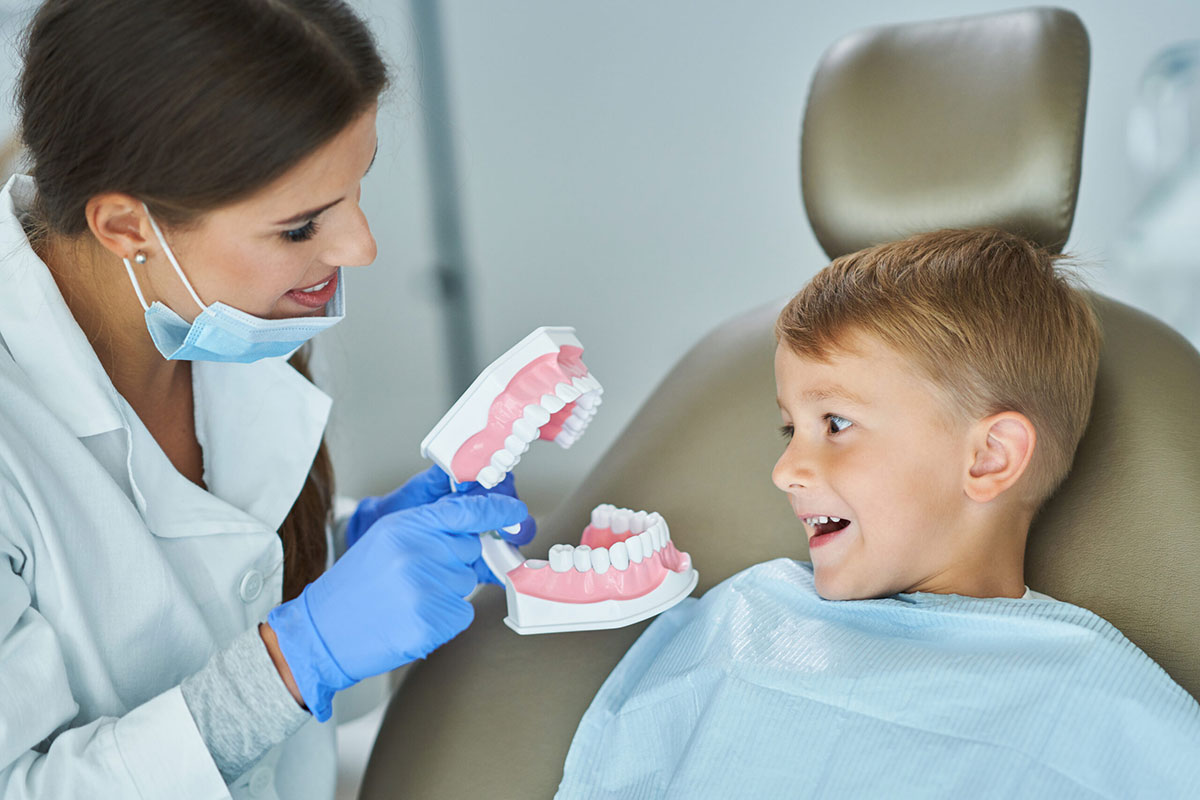Picture this: your kiddo is munching away at their favorite meal when suddenly, a sharp twinge of pain shoots through a tooth and they yell, “Oww!” It’s an awful feeling that signals something’s not quite right with their teeth. “Does my child have a cavity?” you wonder.
Your Denver pediatric dentists, Dr. Paddy, Dr. Roger, and Dr. Meredith, say yes, pain in your child’s teeth might be a sign there’s a cavity and you should come in to see us at Kids Mile High for a professional diagnosis and treatment. But that’s not all! Your child might have other signs of tooth decay so we’ll cover them here, too.
What are Tooth Decay and Cavities?
But before we cover the actual signs of cavities in kids, let’s make sure we’re on the same page as to what exactly tooth decay and cavities are all about. What is tooth decay in children? Like in adults, tooth decay is the gradual destruction of your kiddo’s tooth structure caused by acid-producing bacteria. You see, your oral bacteria feed on the sugars left behind in your mouth after you eat. This process releases acids that erode the protective enamel on your teeth. Weakened tooth enamel leaves your dentin — the softer layer underneath your enamel — exposed and susceptible to tooth decay.
And how about cavities? What causes cavities in kids? Over time, tooth decay can turn into permanent holes in your little one’s teeth called cavities. Deep cavities can expose the nerves in teeth causing painful toothaches, or worse, infection or tooth loss.
So What Causes Tooth Decay in Children?
Understanding what causes cavities in kids can help you and your child prevent them. Here are three of the most common causes for tooth decay:
Poor oral hygiene:
We know that kids aren’t always hyped about cleaning their teeth. But inadequate brushing and flossing allows sticky plaque to cover teeth and produce enamel-damaging acid on your child’s tooth surfaces.
Frequent snacking on sugary and starchy foods:
Kids and snacking go hand-in-hand but keep in mind that teeth need a break sometimes, a break from food that is. Your kids’ teeth need a pause between meals to give their saliva time to do its job: saliva plays a starring role in washing away plaque and neutralizing the acidic pH in your child’s mouth that weakens their tooth enamel.
Excessive consumption of acidic beverages:
It’s not only acids from bacteria that weaken teeth; acidic drinks like juice, soda, or sports drinks can also damage tooth enamel and provide a feast for cavity-causing bacteria. Keeping acidic beverages for rare occasions can help reduce the likelihood of cavities in your kids.

Signs of A Cavity in Kids
So back to that sharp pain your little one experienced when chewing. Let’s talk about that and six other most common signs of a cavity in children.
-
Pain When Chewing or When Drinking Certain Beverages
Sensitivity or pain from a cavity or tooth decay can be especially noticeable when your child chews or bites down, even without food. And certain foods or beverages can trigger tooth pain, too: super sweet foods and beverages like candy, soda, or baked treats can trigger tooth sensitivity. Hard foods like nuts or crunching on ice can crack your child’s enamel. And those sweet drinks? They introduce the acids that weaken enamel over time, exposing the softer dentin underneath closer to the nerves and causing discomfort.
-
Persistent Toothache
One of the most obvious signs your child needs to see your Denver-area pediatric dentist for kids’ cavity treatment? A persistent toothache. Their tooth pain may range from mild discomfort to a throbbing ache depending on the severity of the decay. Ask your kiddo how the pain feels on a scale of 1-10, or if the pain worsens when they bite down on food or consume hot, cold, or sugary items.
One thing we want to mention is that toothaches in kids aren’t always because of cavities. Persistent toothaches in kids can also be because of:
- Adult teeth erupting
- Loose baby teeth
- An infection
- Cracks or damage to their tooth
- A damaged filling
- Aggressive brushing
- Teeth grinding
This is why a professional evaluation by a Kids Mile High dentist is absolutely essential for pinpointing the cause and getting your child the right treatment.
-
Increased Sensitivity To Hot and Cold
Does your child cry out in pain when they sip a hot chocolate or bite into an ice cream cone? Heightened sensitivity to temperature extremes is one of the typical signs of tooth decay in both kids and adults. When your protective enamel is compromised, the underlying dentin is exposed and the nerves inside the teeth are in closer contact with the temperatures of what’s consumed.
-
Dark Spots On Your Child’s Tooth Surfaces
Visible holes, pits, or dark spots on your kid’s teeth could be telltale signs of a cavity. Cavities often appear as white, brown, or black spots on the tooth surface. We suggest making an appointment at our Englewood, Thornton, or Central Park office as soon as you can if you see these discolorations on your child’s teeth.
-
Visible Holes or Pits in Your Child’s Teeth
This is a similar story to dark spots and discoloration. Sometimes cavities in kids look like small holes in their teeth and indicate exactly where your child’s tooth decay has happened.
-
Bad Breath or An Unpleasant Taste
The bacteria responsible for cavities produces unpleasant-smelling gasses that contribute to bad breath. If you can smell that your child has consistently bad breath even after brushing and flossing, this might be a sign of tooth decay. You can also ask them if they have an unpleasant taste in their mouth: chewing food near a decayed tooth can cause a weird taste and point to a cavity.
-
Changes in Tooth Texture
As a cavity progresses, your child may notice changes in the texture of their teeth. The affected area might feel rough or uneven when they run their tongue over it. When cavities are left untreated, tooth decay can advance and weaken your child’s tooth structure.

Why Kids’ Cavity Treatment is Super Important
At Kids Mile High, we want your kids to have the healthiest, happiest, superhero smiles possible. Like the American Academy of Pediatric Dentists, we recommend scheduling your child’s checkups and cleanings every six months so we can catch little problems before they become big ones. When it comes to tooth decay and cavities, regular checkups allow us to spot any early signs of tooth decay in your children and provide prompt treatment.
On the other hand, tooth decay that goes unnoticed could worsen and become bigger, more painful dental problems for your child. Bacteria and acids can move deeper into their tooth, reaching the sensitive pulp that contains the tooth’s nerves and blood vessels. The pulp can then become swollen and irritated, and since there’s no place for the swelling to expand inside the tooth, it presses against the nerves causing pain.
This pain can also travel beyond your child’s tooth root into their jawbone. In severe cases, untreated cavities can lead to tooth loss, infection, and even an abscess — a painful pocket of pus caused by the infection. Ewww.
Making It All Better – Kids Cavity Treatment
Bottom line? If your child’s been experiencing one or several of the cavity signs we’ve discussed above, schedule an appointment immediately with your expert pediatric dentist at Kids Mile High. Your board-certified pediatric dentist will conduct a comfortable exam to confirm if your child has a cavity. We might even use our cool, high-tech DIAGNOdent™, a special laser that detects even the earliest and smallest cavities. Sometimes we’ll also opt to take quick and painless, low-dose digital x-rays to ensure we’ve got the most up-to-date images of your child’s teeth.
Once Dr. Paddy, Dr. Roger, or Dr. Meredith has diagnosed your child’s tooth decay, they’ll suggest an appropriate kids’ cavity treatment. Kids Mile High cavity treatment includes options like:
Tooth-coloured fillings:
We offer tooth-colored fillings color-matched to your child’s tooth. It won’t even look like they had a cavity in the first place! At Kids Mile High, we use Herculite composite resin, one of the strongest composite materials on the market so you know your child’s filling will last.
Pediatric Crowns:
If your child’s cavity is large or most of their tooth structure is now missing because of it, a special pediatric dental crown may be what we suggest for your kid’s cavity treatment. What’s a crown? A crown is a cap over the tooth that covers the entire visible part right to the gum line.
We use NuSmile pediatric crowns on baby teeth to keep them in place until they’re ready to fall out and make way for the adult teeth. NuSmile pediatric crowns are white, metal-free and made from durable zirconia. We color-match crowns to look natural and mimic the shape, contours, and slight translucency of real teeth.
Root Canal Treatment:
When dental decay has reached the pulp of a tooth, a baby root canal may be recommended. Yes, we totally get that a root canal for your wee one can sound a bit scary, but rest assured, your child is in gentle, expert hands. The goal of a root canal for a primary tooth is to save what’s left of your child’s tooth to avoid extracting a baby tooth too early. We’ll restore your child’s tooth with a NuSmile crown so they can chew, talk, and smile with confidence… and without pain!
Tooth Extraction:
Although we do whatever we can to save a baby tooth that’s not ready to fall out, sometimes tooth decay is so bad that it’s healthier to remove it. Tooth extraction is a super last resort, and we make sure your kiddo is comfortable and doesn’t feel a thing. To help our young patients feel at ease, we offer sedation dentistry with nitrous oxide, oral conscious sedation, or in-office general anesthesia administered by the anesthesiologists from CarePoint Anesthesia.
Say Goodbye to Kids’ Tooth Decay With Your Denver Pediatric Dentists
Tooth decay can really put a damper on your child’s everyday life so if they’re going through any signs of a cavity, we’re here to help. Our engaging, kid-friendly office, friendly staff, and high-tech approach make us your go-to pediatric dentist in Denver.
Don’t hesitate to schedule an appointment today.



